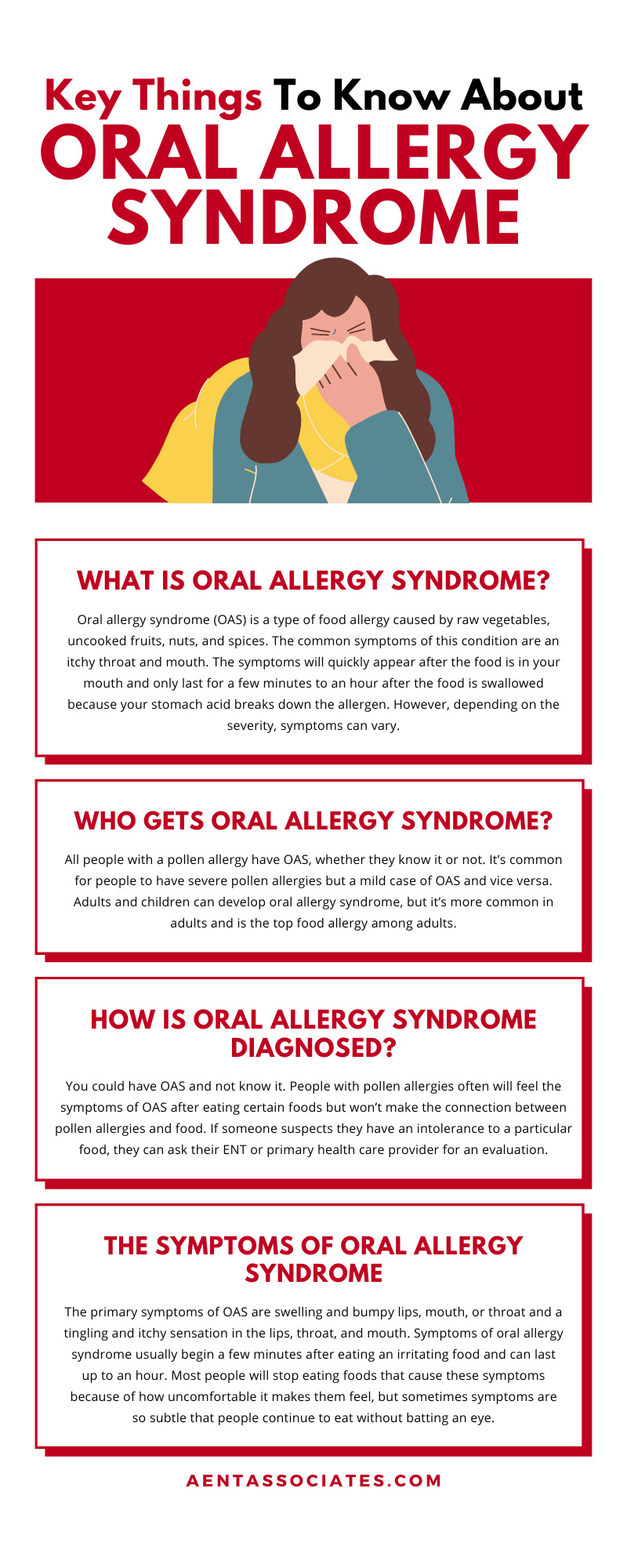Have you ever taken a bite from a mango and felt your mouth get itchy or tasted a pineapple and your tongue swelled? If so, you might have a pollen-food allergy, also known as oral allergy syndrome (OAS). This allergy syndrome develops because the immune system can’t tell the difference between pollen and the protein in the food.
Oral allergy syndrome is common, and if you have seasonal allergies, you may have experienced the symptoms. The exact number of cases is unclear because so many conditions go undiagnosed. However, if you suspect you have OAS, contact your local ENT for an evaluation to prevent future flair-ups.
Since OAS is often undiagnosed, here are six key things to know about oral allergy syndrome to help you determine your next steps toward treating this condition.
What Is Oral Allergy Syndrome?
Oral allergy syndrome (OAS) is a type of food allergy caused by raw vegetables, uncooked fruits, nuts, and spices. The common symptoms of this condition are an itchy throat and mouth. The symptoms will quickly appear after the food is in your mouth and only last for a few minutes to an hour after the food is swallowed because your stomach acid breaks down the allergen. However, depending on the severity, symptoms can vary.
Typically, people with OAS also have allergies to pollen because the proteins in fruit are the same structure as pollen, and your body gets confused, causing an allergic reaction. This condition varies from person to person; a specific apple may trigger one person’s allergies, but that apple might not trigger someone else with OAS.
Who Gets Oral Allergy Syndrome?
All people with a pollen allergy have OAS, whether they know it or not. It’s common for people to have severe pollen allergies but a mild case of OAS and vice versa. Adults and children can develop oral allergy syndrome, but it’s more common in adults and is the top food allergy among adults.
How Is Oral Allergy Syndrome Diagnosed?
You could have OAS and not know it. People with pollen allergies often will feel the symptoms of OAS after eating certain foods but won’t make the connection between pollen allergies and food. If someone suspects they have an intolerance to a particular food, they can ask their ENT or primary health care provider for an evaluation.
Skin testing and food challenges should be done by your ENT to get a professional diagnosis and ensure your safety. An allergy specialist may recommend skin testing for pollens or foods that cause an uncomfortable, itchy feeling. The doctor may evaluate raw fruits and vegetables when you get a skin test because cooked and commercial foods won’t always give them an accurate result.
Another way an ENT may assess you is through the food challenge method. This challenge is done by eating foods and then recording your reactions. This should only be done under your health care provider’s supervision.
The Symptoms of Oral Allergy Syndrome
The primary symptoms of OAS are swelling and bumpy lips, mouth, or throat and a tingling and itchy sensation in the lips, throat, and mouth.
Symptoms of oral allergy syndrome usually begin a few minutes after eating an irritating food and can last up to an hour. Most people will stop eating foods that cause these symptoms because of how uncomfortable it makes them feel, but sometimes symptoms are so subtle that people continue to eat without batting an eye.
OAS symptoms can vary depending on the pollen season. Symptoms are most noticeable during peak allergy season and can last a few months after.
Other OAS symptoms don’t irritate the mouth or throat, which is less common. These symptoms include:
- Developing itchy, red, or swollen hands when holding or peeling raw vegetables and fruits
- Experiencing an upset stomach or nausea
- Having a whole-body allergic reaction, such as chest tightness, difficulty breathing, loss of consciousness, or throat tightness
A List of Oral Allergy Syndrome Food Triggers
People with OAS react to different foods. However, experts know that oral allergy syndrome happens when our bodies don’t know the difference between pollen and similarly structured food proteins.
So, if you have seasonal allergies and want to know which foods to stay away from, get a better understanding of which pollen irritates you the most in your area.
Birch Pollen
- Apples
- Carrots
- Cherries
- Almond
- Kiwi
- Pears
- Peach
- Nectarines
- Hazelnuts
- Peppers
- Plums
Ragweed Pollen
- Banana
- Cucumber
- Melon (watermelon, cantaloupe, honeydew)
- Zucchini
- Sunflower seeds
- Chamomile tea
Grass Pollen
- Kiwi
- Melon (watermelon, cantaloupe, honeydew)
- Peach
- Tomato
- Orange
- Celery
How To Treat & Manage Oral Allergy Syndrome
The best way to treat OAS is to avoid eating your trigger foods or avoid eating them in raw form. Cooking or preparing your food with heat will cause the protein makeup to change and could eliminate the allergen, but that doesn’t work for all foods. Eating canned, frozen, or pasteurized foods may be safer, but eating dried or dehydrated foods can still cause OAS.
Taking Benadryl or Allegra can help with common allergens and symptoms, such as watery eyes and a scratchy throat. However, pre-medicating before eating triggering foods won’t be completely effective.
If you suspect you have a minor case of OAS, you should still talk to your primary care or your local ENT. It would be best to take the initiative to ensure you don’t have a food allergy that can be harmful to your health without proper treatment.
If you have ever experienced more severe symptoms of OAS, such as upset stomach, nausea, or trouble breathing, you should contact your local ENT to get treatment right away and ensure you don’t have a more severe form of a food allergy.
After reading these six key things to know about OAS, do you suspect you have oral allergy syndrome? If so, you’re not alone. More than 50 million Americans experience several types of allergies each year, and if you’re a Texas resident, allergy season is year round. If allergies are left untreated, they can lead to painful chronic illnesses.
At Allergy & ENT Associates, we take treating common allergies seriously by providing effective treatments and strategies to help you experience a better quality of life. Contact us today to inquire or book a same-day appointment for effective and personal treatments that work best for you and your lifestyle.


